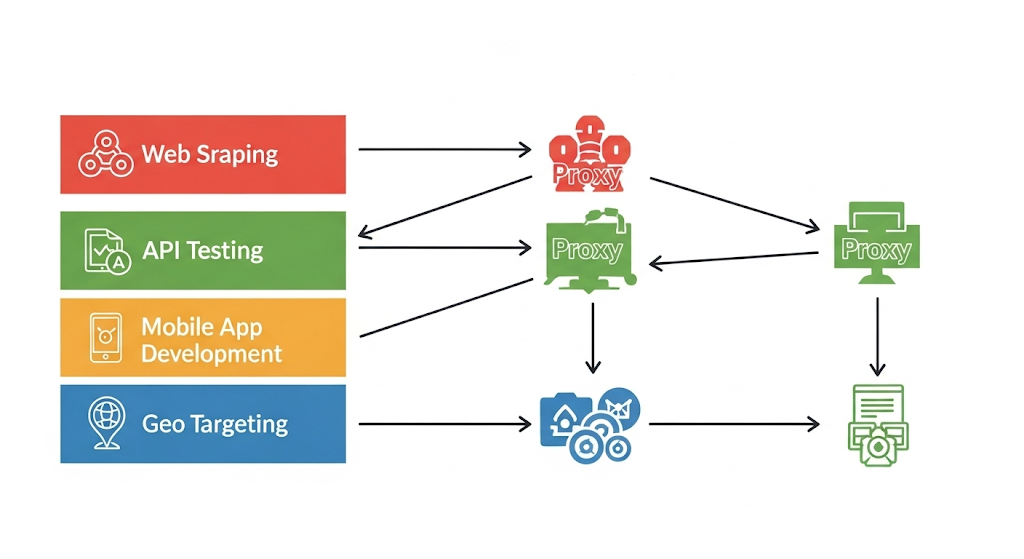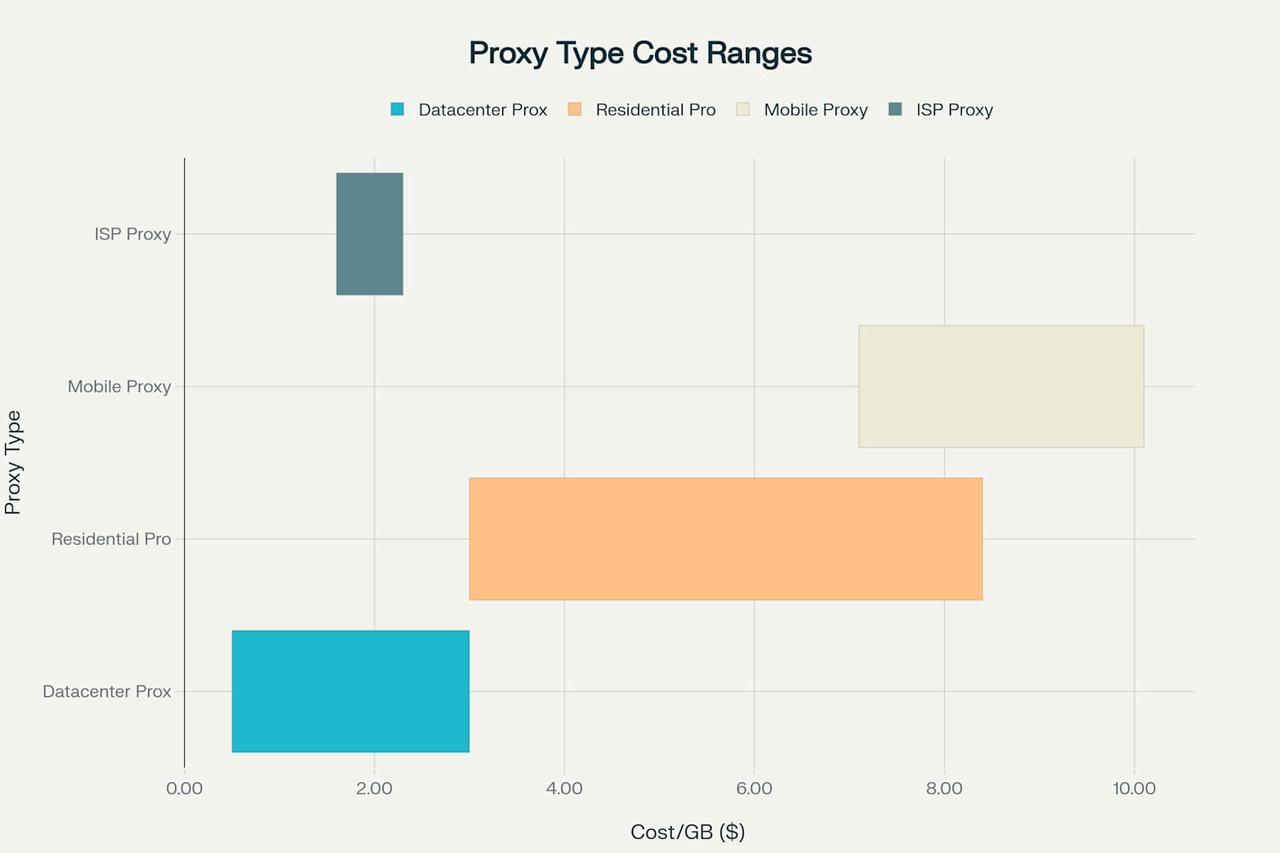2025-07-03 16:51 4722 dibaca

Selecting the appropriate proxy for your coding project is a critical decision that impacts performance, cost, security, and project success. With multiple proxy types available and diverse project requirements, developers need a systematic approach to evaluate their options and make informed choices that align with their technical needs and budget constraints.
Understanding Proxy Types for Development
Datacenter Proxies
Datacenter proxies are the most cost-effective option for developers, ranging from $0.5 to $3.0 per GB. These proxies originate from cloud hosting platforms and data centers, making them ideal for high-volume, speed-critical applications. They offer very fast connection speeds due to optimized infrastructure but come with higher detection risk.
Key characteristics include:
-
Bulk IP allocation reducing operational costs
-
Scalable pricing plans with volume discounts
-
High bandwidth capabilities for data-intensive tasks
-
Easy setup and configuration requiring minimal technical expertise
Residential Proxies
Residential proxies provide the highest level of authenticity by using IP addresses assigned to real residential locations by Internet Service Providers. Priced between $3.0 to $8.4 per GB, they offer superior anti-detection capabilities essential for web scraping and geo-targeted applications.
Advantages include:
-
High reliability with lower blocking rates
-
Realistic browsing behavior mimicking actual users
-
Global geographic coverage for location-specific testing
-
99.9% uptime with automatic IP rotation
Mobile Proxies
Mobile proxies utilize 3G/4G/5G networks and command premium pricing between $7.1 to $10.1 per GB. They provide the highest level of anonymity and are particularly valuable for mobile app development and social media management.
Benefits include:
-
Lower block rates as websites avoid affecting legitimate mobile users
-
High anonymity with constantly changing mobile IP pools
-
Mobile-specific authentication for app testing scenarios
-
Geographic flexibility across multiple mobile carriers
ISP Proxies
ISP proxies offer balanced performance at $1.6 to $2.3 per GB, combining the speed of datacenter proxies with the legitimacy of residential IPs. They represent static residential proxies ideal for applications requiring consistent IP addresses.

Proxy Cost Comparison by Type - This chart shows the cost ranges per GB for different proxy types, helping developers choose based on budget constraints.
Project-Specific Selection Criteria
Web Scraping Projects
For web scraping applications, residential or mobile proxies are strongly recommended. The anti-detection capabilities are crucial when dealing with sophisticated anti-bot systems that monitor request patterns and IP reputation.
Essential considerations:
-
Target website's anti-scraping measures determine proxy sophistication requirements
-
Geographic data requirements influence proxy location selection
-
Request volume and frequency affect rotation strategy needs
-
Data sensitivity impacts anonymity level requirements
API Development and Testing
Datacenter proxies excel in API development scenarios due to their speed and cost-effectiveness. API testing often requires high-volume request handling without the geographic restrictions typical of consumer-facing applications.
Key factors:
-
Request throughput requirements favor datacenter proxy speed
-
Development budget constraints make datacenter proxies attractive
-
Testing environment isolation benefits from dedicated IP pools
-
Protocol support including HTTP/HTTPS/SOCKS5 compatibility
Mobile Application Development
Mobile proxies are specifically designed for mobile app development, providing authentic mobile network characteristics essential for comprehensive testing scenarios.
Critical requirements:
-
Mobile carrier network simulation for realistic testing
-
Device fingerprint compatibility with mobile environments
-
Geographic testing across different mobile markets
-
Network condition variability including 3G/4G/5G testing
Technical Implementation Considerations
Performance Requirements
Proxy performance directly impacts application responsiveness and user experience. Key metrics include latency under 100ms, high bandwidth scalability, and connection stability.
Performance optimization strategies:
-
Connection pooling to reduce establishment overhead
-
Caching mechanisms for frequently accessed data
-
Load balancing across multiple proxy instances
-
Geographic proximity selection for latency minimization
Security and Authentication
Security considerations are paramount in proxy selection. Modern development projects require robust authentication mechanisms, encryption standards, and access control policies.
Essential security features:
-
Multi-factor authentication for proxy access
-
TLS encryption for data in transit
-
IP whitelisting for access restriction
-
Regular security updates and patch management
Integration Architecture
Proxy integration varies significantly between traditional proxy servers and API-based solutions. API proxies offer simplified integration through RESTful endpoints, while traditional proxies provide more granular control.
Integration approaches:
-
API proxy integration for rapid deployment and scalability
-
Traditional proxy configuration for maximum customization
-
Proxy rotation strategies for load distribution
-
Error handling and failover mechanisms
Cost-Benefit Analysis Framework
Budget Planning
Proxy costs scale significantly with usage volume, making accurate budget forecasting essential for project planning. Developers should evaluate both direct costs and hidden expenses including bandwidth overages, setup fees, and maintenance overhead.
|
Usage Volume
|
Datacenter Cost
|
Residential Cost
|
Mobile Cost
|
ISP Cost
|
|
10 GB/month
|
$5-30
|
$30-84
|
$71-101
|
$16-23
|
|
100 GB/month
|
$50-300
|
$300-840
|
$710-1010
|
$160-230
|
|
1000 GB/month
|
$500-3000
|
$3000-8400
|
$7100-10100
|
$1600-2300
|
Return on Investment
Proxy investment should be evaluated against project benefits including improved data quality, reduced blocking incidents, and enhanced application reliability. Premium proxies often provide better ROI through reduced development time and operational overhead.
ROI factors:
-
Development time savings from reliable proxy performance
-
Reduced blocking incidents minimizing retry logic complexity
-
Enhanced data quality improving application accuracy
-
Scalability advantages supporting business growth
Selection Decision Matrix
Project Requirements Assessment
Systematic evaluation of project requirements guides optimal proxy selection. Developers should assess technical needs, budget constraints, security requirements, and performance expectations before making decisions.
|
Project Type
|
Recommended Proxy
|
Budget Range
|
Key Considerations
|
|
Web Scraping
|
Residential/Mobile
|
$3-8/GB
|
Anti-detection
|
|
API Testing
|
Datacenter
|
$0.5-3/GB
|
Speed & cost
|
|
Mobile App Development
|
Mobile
|
$7-10/GB
|
Mobile authenticity
|
|
Price Monitoring
|
ISP/Residential
|
$1.6-8/GB
|
Reliability
|
|
Geo-targeting
|
Residential
|
$3-8/GB
|
Location accuracy
|
Quality Indicators
High-quality proxies demonstrate specific characteristics including low latency, high uptime, global coverage, and robust support. Provider reputation, service level agreements, and trial availability are additional quality indicators.
Quality metrics:
-
Uptime guarantee of 99.9% or higher
-
Response time consistently under 100ms
-
IP pool size ensuring adequate rotation
-
Geographic distribution matching project needs
Best Practices and Implementation Guidelines
Development Workflow Integration
Proxy integration should align with development workflows including version control, testing procedures, and deployment processes. Proper documentation, code comments, and configuration management ensure maintainable proxy implementations.
Implementation standards:
-
Configuration management through version control
-
Environment-specific settings for development, testing, and production
-
Error handling and logging for troubleshooting
-
Performance monitoring and optimization
Monitoring and Optimization
Continuous monitoring enables proactive proxy performance management. Key metrics include request success rates, response times, error frequencies, and resource utilization.
Monitoring strategies:
-
Real-time performance tracking for immediate issue detection
-
Historical trend analysis for capacity planning
-
Alert systems for critical threshold breaches
-
Regular performance tuning based on usage patterns
Choosing the right proxy for your coding project means balancing technical needs, budget, and long-term goals. Datacenter proxies are fast and affordable for large-scale tasks, while residential and mobile proxies offer strong anti-detection capabilities. ISP proxies provide stable, reliable connections. Your choice should match your project's anti-bot challenges, location needs, and performance demands. A thoughtful, cost-effective selection ensures smooth development and future scalability.